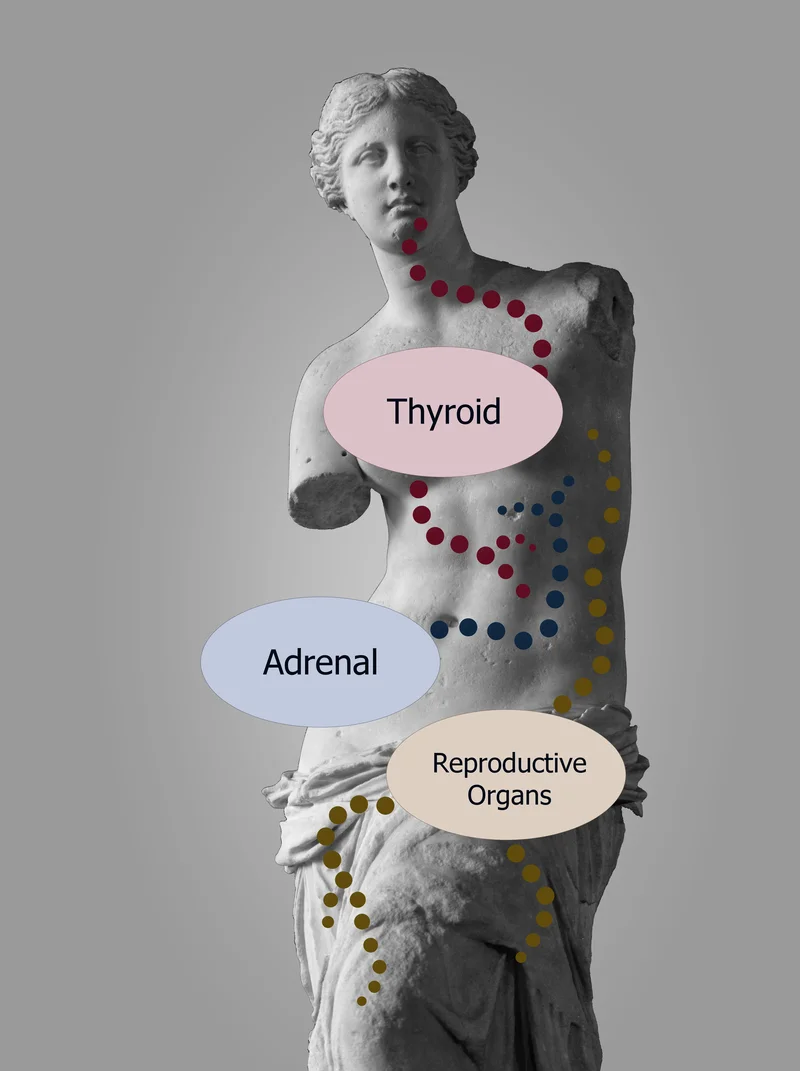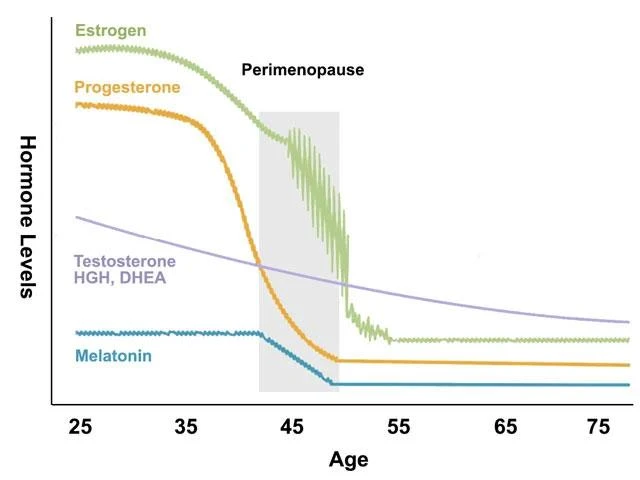What Are Hormones?
Hormones are powerful chemical messengers that orchestrate virtually every function in your body, from metabolism and mood to reproduction and sleep. Scientists have identified over 50 hormones in the human body, and even minor changes in their levels can cause significant physical and emotional symptoms. When these intricate systems fall out of balance, the effects can range from fatigue and weight gain to more serious conditions like diabetes, thyroid disorders, and reproductive issues.
Hormones function as your body's internal communication system, carrying messages through your bloodstream to organs, tissues, and cells throughout your body. Think of them as biological text messages that tell different parts of your body what to do and when to do it. This sophisticated network coordinates everything from your heart rate and blood pressure to your energy levels and ability to handle stress.

Understanding hormones and how to maintain their balance has become increasingly important as research reveals the profound impact of modern lifestyle factors, environmental toxins, and aging on our hormonal health. For millions of people experiencing unexplained symptoms like chronic fatigue, mood swings, or difficulty losing weight, hormone imbalances may be the underlying culprit that conventional medicine often overlooks.
What do hormones do in your body?
Hormones control virtually every physiological process, making them essential for survival and quality of life. Metabolic regulation represents one of their most critical functions, with thyroid hormones (T3 and T4) controlling the rate at which your cells burn energy. These hormones affect nearly every organ system, influencing cardiovascular function, neurological processes, and digestive efficiency.
Your body's stress response system relies heavily on hormones, particularly cortisol from the adrenal glands and adrenaline from the adrenal medulla. Cortisol increases glucose production and suppresses inflammation during stressful situations, but chronic elevation can lead to numerous health problems including weight gain, high blood pressure, and immune dysfunction.

Reproductive hormones orchestrate sexual development, fertility, and reproductive cycles. In women, estrogen and progesterone regulate menstrual cycles, maintain bone density, and affect mood and cognitive function. Testosterone in both men and women influences muscle strength, energy levels, sexual function, and even confidence and assertiveness. These hormones also play crucial roles in maintaining healthy skin, hair, and overall vitality.
The interconnected nature of hormonal systems means that imbalances in one area often create cascading effects throughout the body. For instance, chronic stress elevating cortisol levels can suppress thyroid function, disrupt reproductive hormones, and interfere with growth hormone production.
What makes hormones?
Your body's hormone production centers around a sophisticated network of endocrine glands, each specialized for manufacturing specific hormones. The hypothalamic-pituitary axis serves as mission control, releasing hormones that regulate the secretion of thyroid-stimulating hormone, growth hormone, and other hormones.
| Organ | Hormones |
| Thyroid | T3, T4, Parathyroid |
| Adrenal | Cortisol, Aldosterone, DHEA, Adrenaline, Noradrenaline |
| Ovaries | Estrogen, Progesterone, Testosterone |
| Testes | Testosterone |
The thyroid gland, a butterfly-shaped organ in your neck, produces thyroid hormones T3 and T4 that regulate metabolism throughout your body. The parathyroid glands, four tiny structures behind the thyroid, secrete parathyroid hormone to maintain calcium balance.
Your adrenal glands sit atop each kidney and have two distinct regions: the cortex produces cortisol, aldosterone, and DHEA, while the medulla manufactures adrenaline and noradrenaline for acute stress responses.
Your reproductive organs (ovaries in women, testes in men) generate sex hormones that control fertility, sexual characteristics, and numerous metabolic processes.
Hormone production follows circadian rhythms, with many hormones showing distinct daily patterns. Cortisol peaks in the early morning to help you wake up and gradually declines throughout the day. Growth hormone surges during deep sleep, while melatonin rises in darkness to promote sleepiness.
Conditions caused by hormone imbalances
Hormone imbalances manifest through a wide array of symptoms and conditions that can significantly impact quality of life. Thyroid disorders represent some of the most common hormonal problems, affecting over 20 million Americans, with hypothyroidism being particularly prevalent. Symptoms of underactive thyroid include persistent fatigue, unexplained weight gain, cold sensitivity, brain fog, depression, thinning hair, and irregular menstrual cycles in women.
Perimenopause and menopause create dramatic hormonal changes typically beginning in a woman's late 40s to early 50s. As estrogen and progesterone levels fluctuate and decline, women experience hot flashes, night sweats, mood swings, sleep disturbances, decreased libido, and changes in body composition. These transitions represent natural aging processes, but the symptoms can be severely disruptive.
In men, low testosterone or hypogonadism produces fatigue, decreased muscle mass, reduced libido, mood changes, and increased body fat.
Autoimmune conditions like Hashimoto's disease occur when the immune system attacks the thyroid gland, leading to inflammation and eventual hormone deficiency. This condition requires specialized treatment approaches beyond simple hormone replacement.
Adrenal dysfunction encompasses both overproduction and underproduction of adrenal hormones. Chronic stress can lead to prolonged cortisol elevation, contributing to weight gain particularly around the midsection, high blood pressure, blood sugar imbalances, and mood disorders. Conversely, adrenal insufficiency causes severe fatigue, low blood pressure, salt cravings, and difficulty handling stress.
What causes hormone imbalances?
Understanding the root causes of hormone imbalances reveals why these conditions have become increasingly common in modern society. Natural aging represents an inevitable factor, as hormone production naturally declines with age, particularly affecting sex hormones, growth hormone, and thyroid function. However, the rate and severity of this decline can be influenced by numerous modifiable factors.

Environmental toxins, particularly endocrine-disrupting chemicals (EDCs), pose a significant and growing threat to hormonal health. These chemicals can mimic natural hormones, block hormone receptors, or alter hormone production. Common sources include plastics containing BPA and phthalates, pesticides, PFAS "forever chemicals" in food packaging and non-stick cookware, and synthetic chemicals in personal care products like parabens and synthetic fragrances.
Recent research has identified over 350,000 manufactured chemicals globally, many unstudied for endocrine effects. Low-dose exposures during critical developmental windows may be particularly harmful, potentially triggering early puberty and long-term hormonal disruptions. The ubiquitous nature of these exposures means virtually everyone carries some level of EDCs in their body.
Chronic stress creates hormonal havoc by elevating cortisol levels, which then suppresses thyroid function, disrupts sex hormone production, and interferes with insulin sensitivity. Modern life's "always-on" culture, combined with financial pressures, relationship challenges, and information overload, keeps many people in a state of chronic stress activation.
Lifestyle factors play crucial roles in hormonal balance. Poor sleep quality and inadequate duration disrupt growth hormone, cortisol, and melatonin production. Sedentary lifestyles reduce insulin sensitivity and affect sex hormone metabolism, while excessive exercise can suppress reproductive hormones, particularly in women.

Dietary factors significantly impact hormonal health. High sugar and processed food consumption drives insulin resistance, while inadequate protein intake can affect hormone synthesis. Extreme calorie restriction can suppress thyroid and reproductive hormones as the body conserves energy.
Medical interventions sometimes cause hormonal disruptions. Hormonal contraceptives alter natural hormone cycles, corticosteroid medications can suppress adrenal function, and surgical removal of hormone-producing organs creates immediate deficiencies. Certain medications, radiation therapy, and chemotherapy can also damage endocrine glands.
How to treat hormone imbalances
Modern hormone treatment has evolved to embrace individualized, comprehensive approaches that address root causes while providing symptom relief. Bioidentical hormone replacement therapy (BHRT) has gained popularity because it uses hormones structurally identical to those produced naturally in the body, theoretically offering better compatibility than synthetic alternatives.
BHRT can be delivered through multiple methods, each with distinct advantages. Oral medications remain most common and convenient, available in both standardized and compounded formulations. Topical creams, gels, and patches allow hormone absorption through the skin with accurate dosing, although they may not provide sufficient levels for those requiring higher doses. Injectable forms and pellet implants deliver hormones for longer periods but can cause spikes rather than the gradual release that better mimics natural hormone cycles.

The key to successful hormone therapy lies in comprehensive testing and individualized treatment plans. Rather than relying solely on basic hormone panels, effective treatment requires examining multiple hormones through blood, urine, or saliva tests, often timed to specific menstrual cycle days in women. Ongoing monitoring ensures optimal dosing and prevents the risks of over-replacement.
Recent research developments have refined hormone therapy safety profiles. The Women's Health Initiative 20-year follow-up data shows that menopausal hormone therapy is safe for appropriate candidates when started within 10 years of menopause onset.
Functional medicine approaches emphasize treating underlying causes rather than just replacing hormones. For thyroid conditions, this might involve elimination diets to identify food sensitivities, targeted supplements to address nutrient deficiencies, and stress management techniques. For autoimmune thyroid conditions like Hashimoto's, reducing inflammation through gut health optimization becomes crucial.
Lifestyle interventions form the foundation of hormonal health and often prove as effective as medications for mild imbalances. The Mediterranean diet pattern reduces inflammation and supports hormone metabolism, while regular moderate exercise improves insulin sensitivity and helps balance sex hormones. Stress management through meditation, yoga, or counseling directly impacts cortisol levels.

Environmental toxin reduction strategies include choosing organic foods when possible, using glass or stainless steel food containers instead of plastic, selecting personal care products free from parabens and synthetic fragrances, and installing water filtration systems to remove contaminants.
Targeted nutritional supplementation can support hormone synthesis and metabolism. Magnesium supports over 300 enzymatic processes including hormone production, vitamin D is essential for hormone synthesis, and omega-3 fatty acids provide building blocks for hormone formation. Adaptogenic herbs like ashwagandha have clinical evidence for reducing cortisol levels and supporting stress resilience.
The most effective treatment approaches combine conventional medical therapy with evidence-based lifestyle interventions, tailored to each individual's specific imbalances, symptoms, and health goals. This integrative strategy addresses both immediate symptom relief and long-term hormonal health optimization.
Conclusion
Hormones represent your body's sophisticated internal communication network, orchestrating everything from metabolism and mood to reproduction and stress response. When these systems become imbalanced due to aging, environmental toxins, chronic stress, or lifestyle factors, the effects can be far-reaching and significantly impact quality of life.
The evolution toward personalized hormone therapy offers new hope for the millions experiencing hormonal imbalances. By combining comprehensive testing, individualized treatment protocols, and evidence-based lifestyle interventions, it's possible to restore hormonal balance and reclaim vitality. Whether through bioidentical hormone replacement therapy, targeted nutrition, stress management, or environmental toxin reduction, effective solutions exist for those willing to take a proactive, informed approach to their hormonal health.

The key lies in working with knowledgeable healthcare providers who understand the complexity of hormonal systems and can develop comprehensive treatment plans addressing root causes rather than just managing symptoms. With proper evaluation, treatment, and ongoing monitoring, hormone imbalances need not define your quality of life or long-term health outcomes.
As part of our stress reset approach, we devise a full body-balancing protocol that also rebalances other areas that may be causing havoc including diet, gut health, lifestyle, stress factors, sleep habits, insulin resistance, and other hormonal imbalances.
If you have been experiencing symptoms that may be connected with hormone imbalances and are looking for answers, schedule a free consultation so we can talk about the appropriate lab testing and follow-up to restore your hormones to optimal levels to look and feel your absolute best.
